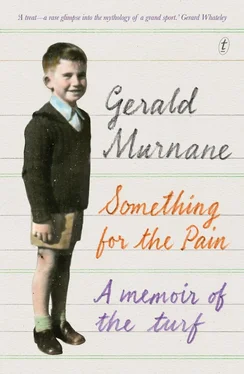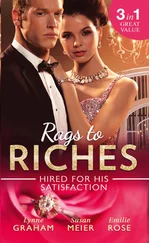I kept away from the Ortliebs and their endless grizzling about the poor pay and conditions in their workplace. I would have kept away from Mrs Smith too, but she seemed to know in advance when I would be at the letterbox or walking down the side path and would come out of her front door and keep me talking. She and her husband, John, were a childless couple in their forties or fifties. I saw him sometimes leaving early for work. He was certainly not a white-collar worker but I never learned what humble job he did. She stayed at home all day and had hardly any visitors. I wondered why they rented a house much larger than they needed. I gathered from things she let slip that she had inherited a large house and, perhaps, even a farm in the Shepparton district and intended one day to return there. When I think of her now, I think of the phrase old-fashioned . Perhaps because she had never brought up children, her ways and manners seemed to belong to an earlier decade. I’m pretty sure she addressed me by my first name, but she was always Mrs Smith to me.
Mrs Smith alone was not at all hard to put up with, but I began to think of moving elsewhere whenever Glenys was around the place. I don’t know whether I’ve spelled her name correctly but Glenys was a girl perhaps a few years older than myself who sometimes stayed with Mrs Smith of a weekend. Glenys, if you’re reading these pages more than fifty years after we last met, you’ll probably be offended by my describing you as a plain-looking young woman, but you’d surely concede that you were never going to offer yourself as a Miss Australia candidate. Yes, I’ve written my harsh words now, and I’ll have to let them stand. Glenys was a plain-looking young woman. She was also like me in being something of a loner. When a person from Glenys’s and my age group spent Saturday evening alone, it raised the strong possibility that he or she was without a boyfriend or girlfriend. Glenys seemed to turn up every few weeks at Wheatland Road and to spend the Friday and the Saturday evening alone with the Smiths. Mrs Smith would surely have observed that I myself was alone on those evenings. I was without a girlfriend during the whole of my time at Wheatland Road, although I had occasional visitors — mostly solitary males like myself but sometimes an engaged couple that I knew and once, for a few hours, a young woman that I had hoped might become my girlfriend. I should add that although I spent most of my weekends alone, I never considered myself an object of pity whereas I tended to feel sorry for Glenys. I went to the races every Saturday. I had no fridge where I could keep beer cool, but I bought supplies of rum and mixed it in equal parts with Schweppes lime cordial to make a palatable and heart-warming drink. I spent my evenings sipping my mixture and reading. Sometimes I even wrote a little. I would never have said that I was living my ideal life, but after I had drunk a certain amount of my rum-and-lime I supposed I was very soon to meet up with a compatible young female person. I even supposed she might have been sitting just then as I was — alone and in need of company. But I never supposed that she was Glenys, who might have been sitting just then on the other side of our dividing wall.
I spoke to Glenys once — more than once. Mrs Smith caught me with my guard down on one of the first occasions when Glenys was visiting Wheatland Road. Before I could think of an excuse, Mrs Smith had got me to have afternoon tea on her front veranda with Glenys and herself and — strangely, it seems to me now — a young woman from next door. The surname of the young woman was Monk, and whereas Glenys and I were introduced to one another by our given names, the neighbour and I were introduced to one another by our surnames, and even Mrs Smith addressed her as Miss Monk . As I said earlier, Mrs Smith was oddly old-fashioned.
I have no recollection of what was talked about at the tea table but nor do I recall any uncomfortable silences or embarrassing gaffes. Still, if Mrs Smith had hoped that I might afterwards have asked Glenys to take a turn with me around the front lawn and might have asked Glenys while we walked if she cared to go to the races with me next Saturday, nothing of the sort happened. Though Glenys returned every few weeks to Wheatland Road, she and I remained as far apart as ever.
This book is supposed to be about horse racing, and yet the races have hardly been mentioned in all the preceding pages of this section. I’ll shortly introduce Summer Fair, winner of the famous leg-pull AJC Derby at Randwick in October 1961. Before then, I have one last thing to tell about Glenys. One fine and warm Sunday morning after Glenys and I had each slept alone in our solitary beds on the Saturday night under the same roof but separated by several walls, I heard from just outside the window over my sink the sound of the back door opening — Mrs Smith’s back door. Next, I heard the clattering of high heels on the concrete path leading to the clothesline that all three tenants shared. The line was bare at the time. I must have brought my own washing in earlier. Perhaps I was leaving my washing until later in the day. Anyway, the high heels belonged to Glenys. She clattered to the line and then used a pair of pegs to suspend from the nearest wire a pair of ladies’ pants, briefs, whatever you want to call them. That was all. She hung the things there in the backyard, on the otherwise empty clothesline, and then clattered back to the house. She had on her face the sort of fatuous half-smile I had sometimes seen there. It was one more of the things that prevented me from becoming interested in her.
So, now I had something novel to look at: a centre of attention in what had been an empty backyard. Now, there dangled in the breeze this cute little item of ladies’ underwear. As I recall, the colour of the item was steel grey or, perhaps, pale blue. There was not much substance to the item. I mean, they were a brief pair of pants, to put it plainly. They were not exactly opaque, either. In another context, they might have been described as revealing . Anyway, there they hung, somewhat to the mystification of the solitary young man who was staring at them from his bachelor’s lair. I’ve mentioned already in this book that I’ve always had the greatest difficulty understanding the behaviour of females, especially when it has to do with romantic or sexual matters. I could not even be sure whether Glenys’s hanging out a pair of pants on a Sunday morning was any sort of message. But supposing it was a message, what sort of message had she hoped to get from me in return? Not that I had the least intention of replying to her lingerie-bunting. I had been trying for months past to make it clear to Mrs Smith and to Glenys that I was not interested in the young woman. But this seemed an opportunity to improve my skills in dealing with young females. I felt obliged to consider what I might have done if I had been interested in Glenys and wanted to respond to her message.
What was I expected to do? Should I walk out to the clothesline and stare up at the things as though imagining them clinging to the hips and groin of their owner? Should I feel them? Should I steal them — lift them down from the line and carry them off to my room, there to wait for her to claim them and not to return them until she had paid the price of a kiss? Perhaps I should rinse out a clean pair of my own Jockey underpants and hang them on the nearest line and parallel to her undies, so that the breeze lifted each item towards the other in a series of airborne pelvic thrusts? It was all so crazy. I drew the curtains across my windows and went on with my reading or writing.
And now for Summer Fair! I’m somewhat ashamed to report that I can’t recall his colours. I recall only a predominance of red with markings of white or pale blue. I don’t even know whether he was a gelding or a colt but, like every other person who followed racing in 1961, I recall that Summer Fair won the AJC Derby of that year on protest. He had been beaten across the line by Blue Era (Red, black-and-white striped sleeves, black cap) but his rider, Tom Hill, had protested that the rider of Blue Era, Mel Schumacher, had held him, Hill, by the leg as the horses approached the line. This was verified by the stewards after they had seen film of the race. Summer Fair was promoted to first, and Mel Schumacher received a long suspension for foul riding.
Читать дальше












